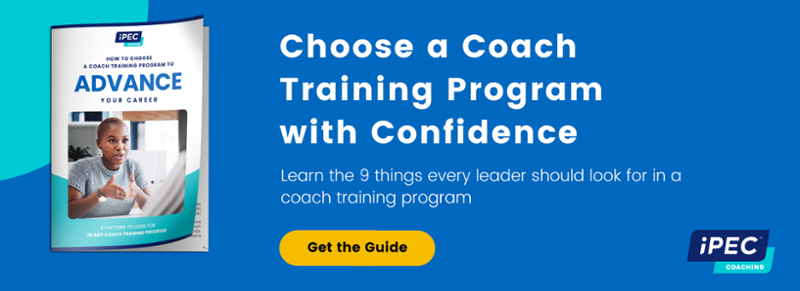Coaching: An Opportunity Occupation
by Grace Germond
Dec 22, 2016 | 9 minutes read
It’s All Opportunity
Far more than just a career opportunity, coaching is a ‘gateway to options’ that will expand your view of the world and how others experience it too.
Have you ever been fascinated – or perplexed – by the startling difference in how two people can view the exact same situation?
One illustration of this involves two shoe sales representatives sent to assess the potential of a new market, a remote island nation considered to be a third-world country.
The first arrives, observes that in this culture everyone goes barefoot, and reports back to the corporate office, “The market here is hopeless; there is zero demand for shoes. I recommend we focus on growing market share in our existing distribution channels.”
The second sales representative shows up six months later, witnesses the exact same thing, and excitedly calls the V.P. of Sales exclaiming, “This could be the best market we’ve ever entered! Nobody has shoes yet!”
Pitfalls vs. Possibilities
And so it is in real life. Either we approach each experience with expectation, looking for possibilities; or we tend to be overly cautious, apprehensive about what pitfalls may await.
This fundamental approach to the world is reflected in whether one exhibits anabolic energy (positive/rejuvenating) or catabolic energy (negative/draining). Do we see opportunity in the situations we encounter? Or are we forever on alert for problems and how to avoid them?
Understanding this distinction is what makes coaching, as an occupation, so fulfilling. Coaching gives us the insight and tools to:
- Always see opportunity
- Find endless possibilities
- Create the time and financial flexibility we desire – instead of only what we find.
The beautiful thing about coaches is that they do this first for themselves, and subsequently, with each and every client!
Everything as an Opportunity
Through coaching, we acquire the skills to see everything as an opportunity.
Coaching, as an occupation, centers on helping others expand their view: to shift from seeing only problems that need to be ‘solved,’ to recognizing that opportunity is usually disguised as obstacles.
This is much more than just a sunshine and rainbow view of life. It actually involves a shift in our capacity to perceive what exists around us.
Without getting too technical, changing our perception is about removing filters that keep us from seeing what is actually happening, or what could be happening instead. By overcoming our conditioning, we stop relying on habitual answers, behaviors, and responses. When that happens, opportunity is the surprising new element that enters the picture, simply because it stops being filtered out!
Question the Questions
True vs. Truth
Let’s look at an example, one you’re sure to have encountered before. Is this glass half empty, or half full?
Now most people answer this based on the assumption that the question is a matter of opinion, that it’s a glib test intended to display whether we are an optimist or pessimist.
Well, that’s a common and habitual response. But what if we approach it as a serious question?
The fact is the glass is always full. It’s either full of liquid, or full of air, or some combination of the two.
“Hey, that’s not fair! It’s just a trick of words.”
Or is it?
Always Question the Question
As coaches, we know that before seeking answers, we must always Question the Question. In this case the question, as presented, implies that the answer must only be “half empty” or “half full.” Until we stop to examine the question itself, finding a different answer is impossible.
Seeing opportunity is a matter of questioning our assumptions, limiting beliefs, and interpretations. After all, truth is what really is, while true is simply what we believe based on our perception at the time.
Unless we begin with questioning our perceptions, how can we hope to find new answers as we approach the challenges we encounter?
OPPORTUNITY: Coach Training through iPEC ensures that you become more attuned to possibilities – a skill that will come to permeate and be reflected in every aspect of your own life.
Seeing the (previously) Unseen
All good coaching begins here – helping another see themselves and their situation as they really are, rather than through the filters of assumptions, limiting beliefs and interpretations.
Rather than seeing problems, we view obstacles as challenges to be addressed. We also know that every challenge presents an opportunity… if we allow ourselves to see it.
By attuning ourselves and our clients to constantly be on the lookout for the opportunity that resides in every issue, we find more of it, wherever it exists. Soon, we quickly see opportunity where others struggle to find it!
Now you’re beginning to grasp the first reason why coaching is called an Opportunity Occupation. It’s literally about seeing opportunity that others filter out, and becoming attuned to what previously remained unseen. This is accomplished through training, practice and gained experience.
Coach Training through iPEC ensures that you become more open to opportunity – a skill that will come to permeate and be reflected in every aspect of your own life. More importantly, this new skill you acquire can be shared with, and taught to, your clients. The ability to move clients in the direction of opportunity is just one of the reasons that iPEC coaches stand out as exceptional and are in high demand.
Communication
Endless Possibilities
Another reason that coaching is referred to as an Opportunity Occupation is that there are endless possibilities for you to use your unique coaching skills in the world.
Every career, industry, business endeavor and aspect of one’s life can be improved through the application of the skills possessed by a coach.
Why? Because coaching skills are a fundamental dialogue; a tool- kit comprised of communication skills. We first begin with the internal communications: questioning how we know what we know and examining our assumptions, limiting beliefs and interpretations.
Coaching then helps us apply this understanding to our external communications, and this is where it gets really interesting.
Powerful Coaching = Better Questions + Better Listening
As soon as we involve another human being, communication is a two-way interaction, and listening becomes paramount. And a coach, by definition, is a great listener.
First, you start to listen for the ways in which others reveal their assumptions, interpretations, and beliefs. Next, your coach training shows you how to begin asking better questions. By using empowering questions, you actually make it possible for the other person to provide more and better answers, and that’s when listening becomes truly exciting.
OPPORTUNITY: Employers use a mix of external coaches (for intervention in sensitive leadership situations) and internal coaches (to help teams and leaders create high-performance partnerships). Source: Sherpa, 2016 Coaches’ Earnings Report
For example, if your current profession involves sales, advising clients or collaborating with fellow employees, you may initially hear a person express what they need from you. On the surface, they seem to know what they want.
Yes, but what if that person (like many of us) is interpreting their situation and needs through a set of filters? What if their own assumptions and beliefs have caused them to overlook potential opportunities and possibilities? Could your new-found coaching skills help you explore with this person a better way to meet their needs, accomplish their objectives, and/or benefit from your services?
Becoming the Catalyst for Others
The better you become at communicating, (more than half of which is questioning and listening), the better you are at all the things you do.
Over and over again, through our interaction with coaches and clients from around the world, we hear that coaching empowers people to become a better spouse, sibling, parent, friend, coworker, manager and business owner – all at the same time.
How often have you witnessed or been involved in a conflict between people and then later learned that it could have been entirely avoided had the communication been better?
Truly masterful communication as a coach is much more than just getting your point across or clearly hearing what someone says. It requires an awareness of what is not being said, and involves helping the other person understand themselves, as well as their filters and blind spots.
Are you beginning to sense why coaching has such a profound influence on those it touches? When these skills reside in you and become second nature during your interaction with others, how will the lives of those around you be improved? Just as importantly, how will your life be affected when others recognize you as the catalyst for the positive changes they begin to witness in themselves and others?
Perhaps you’re now beginning to understand why coaching has such a broad application and tremendous impact.
However, having a positive impact on the world does not just happen by chance, and good intentions do not constitute a business plan. How, specifically, will you use your new skills to make a living as a coach and build a better lifestyle for yourself?
Coaching Opportunities within an Existing Career
Some iPEC graduates opt to create opportunity within a current role: they incorporate coaching skills into their existing career or profession. This allows many certified coaches to re-engage with their career in entirely new ways. It infuses all of their career interactions with a new sense of meaning and purpose. Coaching skills permit them to explore new approaches to challenges on the job once thought to be intractable. Instead of going back to just solving problems for others, they now have the skills to help people explore their own solutions. The entire organization grows stronger, and the results are often far greater than could be attributed to any single individual. Best of all, many companies have budgets set aside for employee training and development, so your employer may even cover the cost of tuition.
Financial Freedom & Flexibility
It’s one thing to realize that you could apply your coaching skills nearly all day long with everyone you encounter. It’s quite another to have the freedom and flexibility to choose when you conduct business and what you charge.
Name the Time & Place
One of the truly remarkable benefits of a coaching profession is that you can weave it into an existing career, consulting practice or field of interest. What’s more, if you only want to pursue coaching part time, you can determine your schedule and when you’re available.
OPPORTUNITY: Coaching allows you to choose your clients, how much you charge per session, where you work from, your hours, and whether to do it full time or part time.
Of course, a full-time coaching practice doesn’t necessarily mean 9 to 5 and five days a week. Many times your clients will hold regular jobs themselves, and you may elect to accomplish some of your coaching in the evenings. This allows you to benefit from more flexibility during your days.
Let’s also not forget that coaching can be conducted over the phone, and many coaches have clients in various time zones around the world. That truly gives you the flexibility to work where and when you want!
Many coaches love the fact that they can travel whenever they want, confident that as long as they have phone reception or can make an internet call, their business continues without interruption.
Play a Bigger Role
The flexibility between time and location of coaching sessions doesn’t just mean you shake up your calendar. It frees you up for many exciting endeavors that will fulfill your interests and advance your practice.
For instance, many coaches become so well known in their field of interest that they:
- Conduct a regular podcast by interviewing others in the field
- Host a radio program
- Are sought out as a guest expert on TV or radio shows
- Contribute to a regular news column or blog
- Lead live workshops
- Travel to training summits or conventions
- Volunteer at charitable causes and events
During your training, you will encounter many successful iPEC graduates who engage in these and other activities as part of their new coaching lifestyle.
OPPORTUNITY: iPEC pairs every student with a successful mentor coach, providing a real-life glimpse into your new occupation. In fact, pairing you up with a mentor coach is just one of the ways that iPEC ensures that you get a real-life glimpse into what your new Opportunity Occupation can look like.
Set Your Own Fees
Of course, the primary reason you have all this flexibility as a coach is that you determine your pricing and how you want to offer your services:
- Individual session rates
- Group session size and pricing
- Packages that clients can purchase in advance
- Multiple session offerings that span months or a full year
- Workshops or one-time events (that lead to more referrals)
Coaching, as a profession, is gaining more recognition. With that visibility comes greater demand AND the willingness of clients to pay well for your services. According to a recent study (Sherpa, 2012), experienced life coaches charge $160 per hour, and executive coaches earn roughly $106,000 annually.
“How will I find enough clients to make that kind of money?”
This is the biggest worry for those thinking of becoming a coach. No matter where you do your coach training, what good is it if you can’t find any clients to actually coach? Learning to coach and learning to market yourself are two very different skill sets. Your interest in becoming a coach may be intertwined with your desire to work for yourself. You’re not only training to become a coach, you’re training to become an entrepreneur!
This is another area where our training really stands out. We integrate an extensive business development program within the core curriculum so that you can become extremely COMFORTABLE and CONFIDENT talking about coaching and your services, culminating in masterful coaching and a successful business.
Highlights of our accredited coach training program include:
- Business Development Program
- Success Coach
- Mentor Coach
Is it effective?
Over 85% of our students have paying clients BEFORE they graduate.
Why? Because our curriculum focuses a substantial portion of time on each student, building his/her own coaching practice through business development, brand messaging, and marketing.
And, the support doesn’t end when you graduate. The iPEC coach community supports you through continuing education, networking, and personal support – throughout your entire coaching career.
Is this your time for opportunity?
Now it has become clear that coaching is a gateway to options – choices that you previously had not even considered.
You also understand that coaching itself offers unique possibilities too numerous to count.
You now have a vision of the multiple ways that coaching will transform your own relationship with opportunity.
You’re beginning to have a realistic image of yourself using coaching skills in your life. And, you can see that any previous doubts were largely a function of ingrained limiting beliefs and interpretations that are merely habit.
OPPORTUNITY: Over 85% of iPEC students have paying clients BEFORE they graduate.
Your desire to become a coach is now growing from a thought into a strategy, which you can examine and support. You can now begin to explore various approaches for making this opportunity an actual part of your life.
Ready to Learn More?


